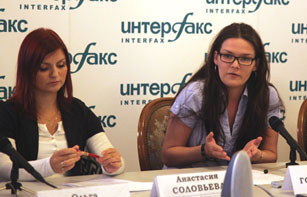
Anastasia Solovieva, head of “Unity Fidelity Advocacy" (left) and Maria Godlevskaya, member of the network and head of the charity foundation Candle (right) during the official presentation of the Russian network of women living with HIV. Saint Petersburg, 5 March 2011.
“Women need help to overcome fear and to defend their rights,” says Anastasia Solovieva, head of the first Russian network of women living with HIV, called “Unity Fidelity Advocacy".
The network, launched on the eve of the International Women's Day in Saint Petersburg is supported by UNAIDS. It unites women and organizations supporting them from various parts of Russia to improve the quality of life of women affected by HIV. Through integrated HIV services, the network advocates for wider access to HIV treatment, care and support and the protection of human rights.
In the past decade the spread of HIV has shifted in Russia. HIV transmission has moved from injecting drug use to include heterosexual transmission. And there has been a rise in the number of women living with HIV.
Natalya Ladnaya, chief officer of the Russian Federal AIDS Centre, points out that 65% of women who became infected in 2010 were infected through sexual contact. Many women have been infected by their husbands, and first learned of their HIV-positive status during pregnancy.
We need to work together to adapt the health system to the needs of women affected by the AIDS epidemic
Anastasia Solovieva, head of the Russian network of women living with HIV “Unity Fidelity Advocacy"
According to Ms Ladnaya, lack of HIV prevention programmes among women and very low levels of awareness about the virus and how to prevention transmission are some of the reasons behind this situation. “Women often do not insist on using a condom,” added Maria Godlevskaya, member of the new network and head of the charity foundation Candle.
In Russia, as many as 95% of pregnant women living with HIV receive antiretroviral therapy to prevent HIV transmission to their babies. However the country still faces many challenges in the wider area of sexual and reproductive health. Many women at higher risk of HIV infection do not have access to services for the prevention of mother-to-child HIV transmission (PMTCT).
According to reports from civil society organizations in different regions of Russia, stigma in society and even among healthcare workers discourages pregnant women living with HIV to approach healthcare facilities. Additionally, sex workers and women who inject drugs are even less likely to be able to access PMTCT services for fear of discrimination.
"It is especially difficult in the remote regions of Russia,” said Ms Solovieva. “We need to work together to adapt the health system to the needs of women affected by the epidemic.”




